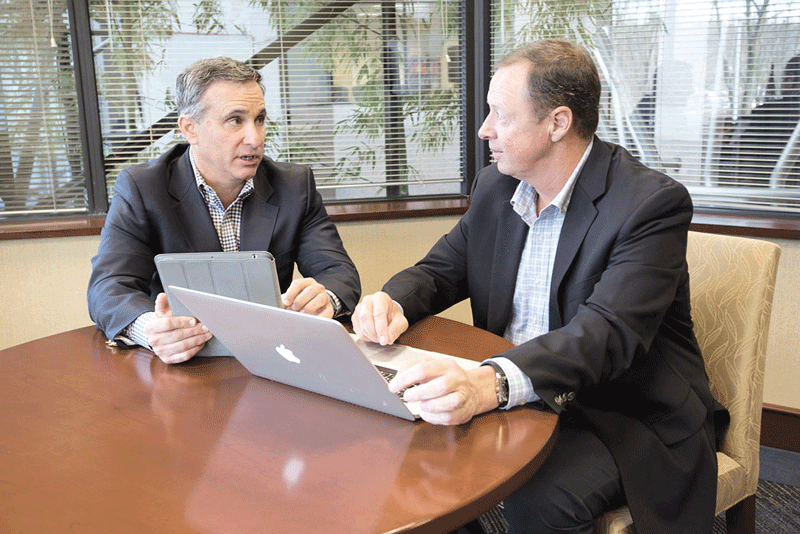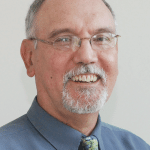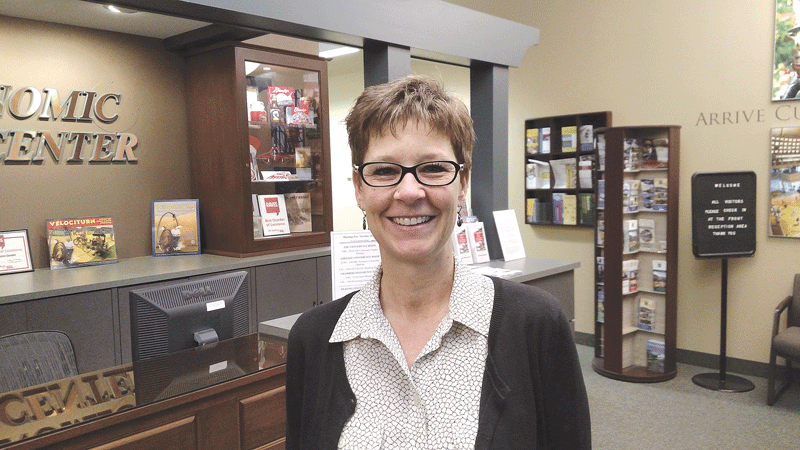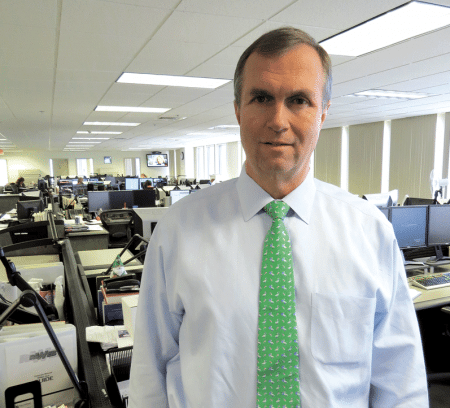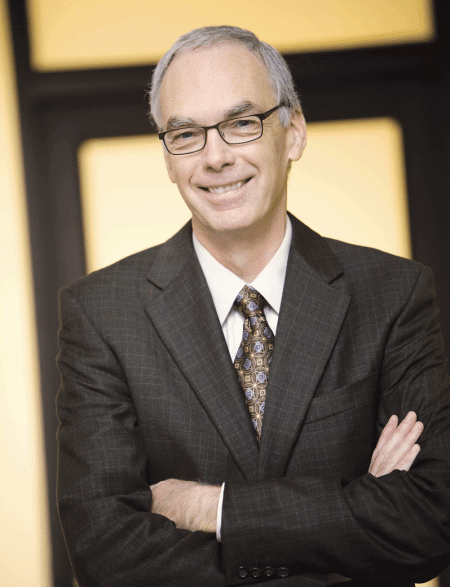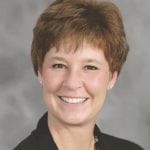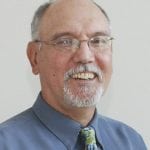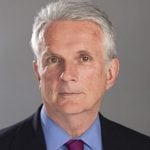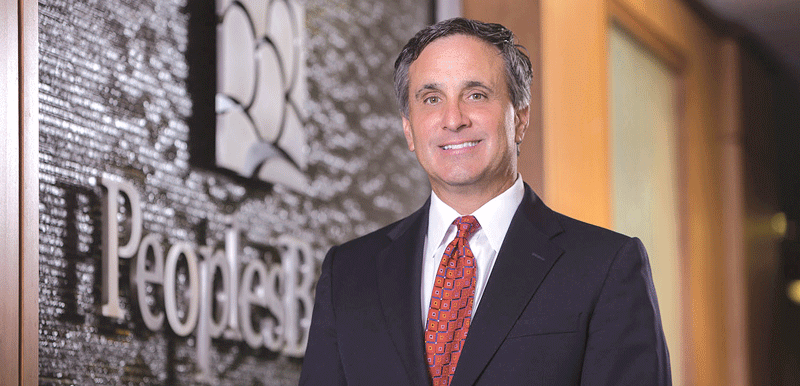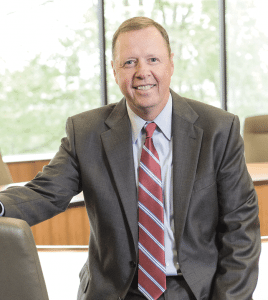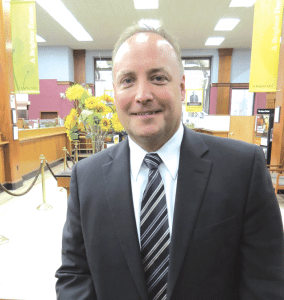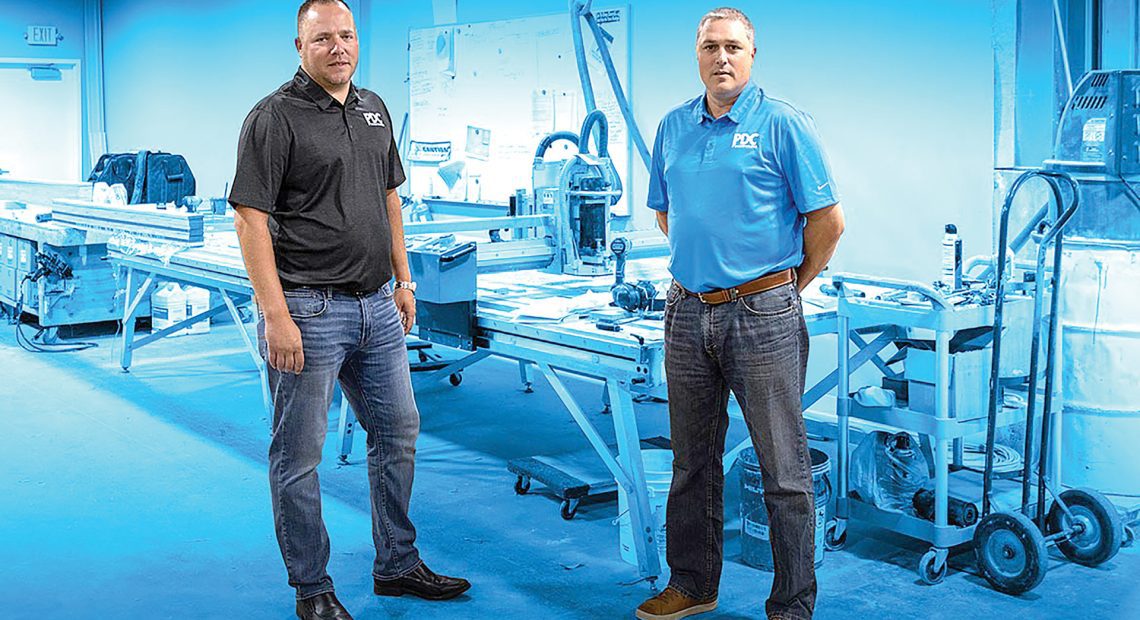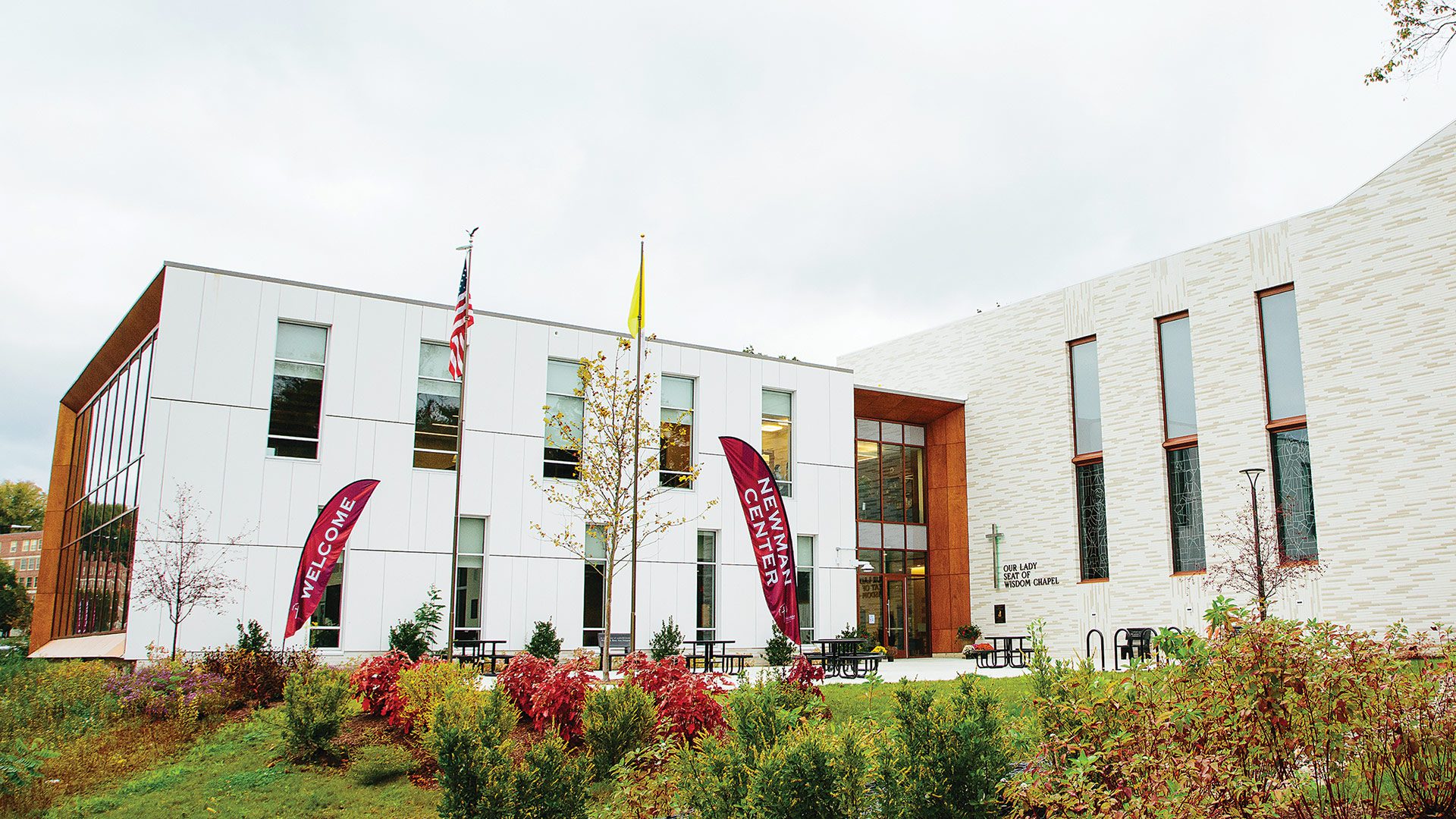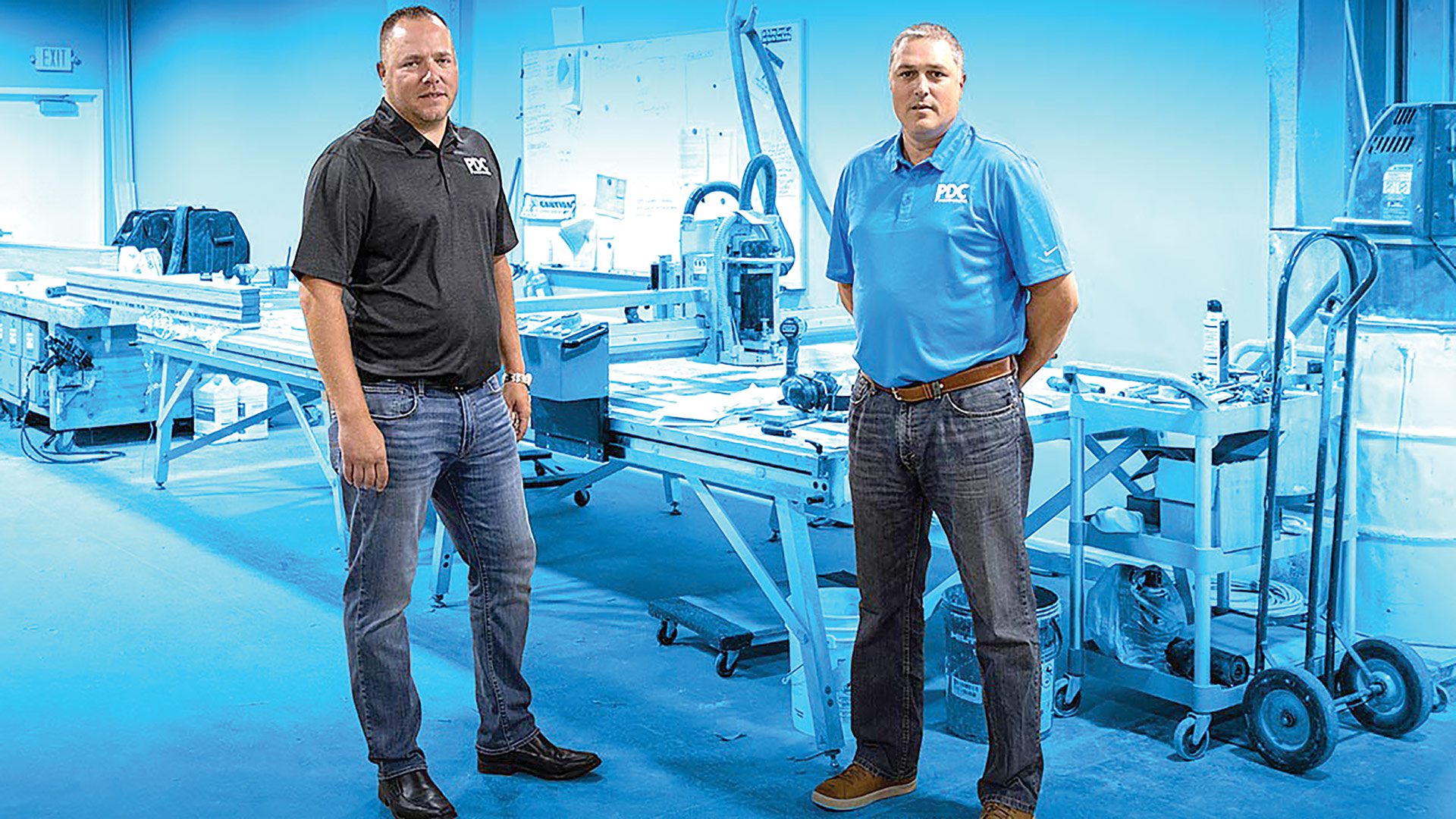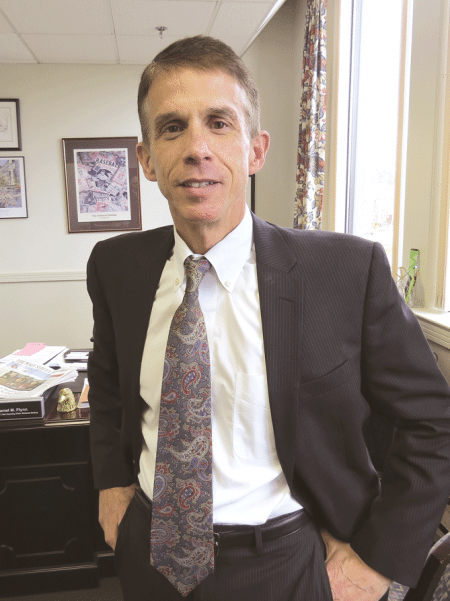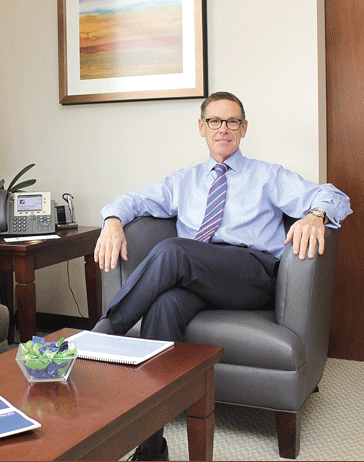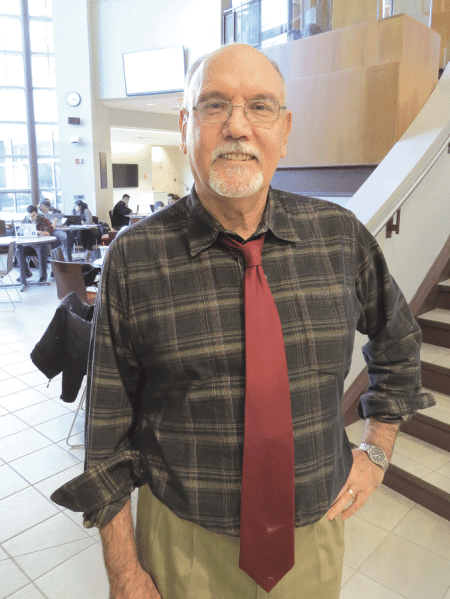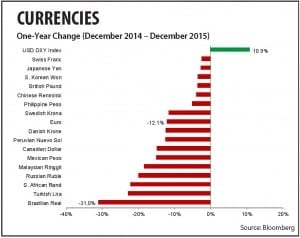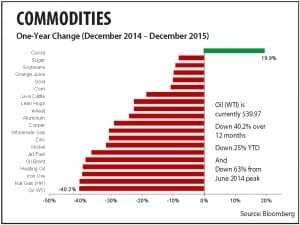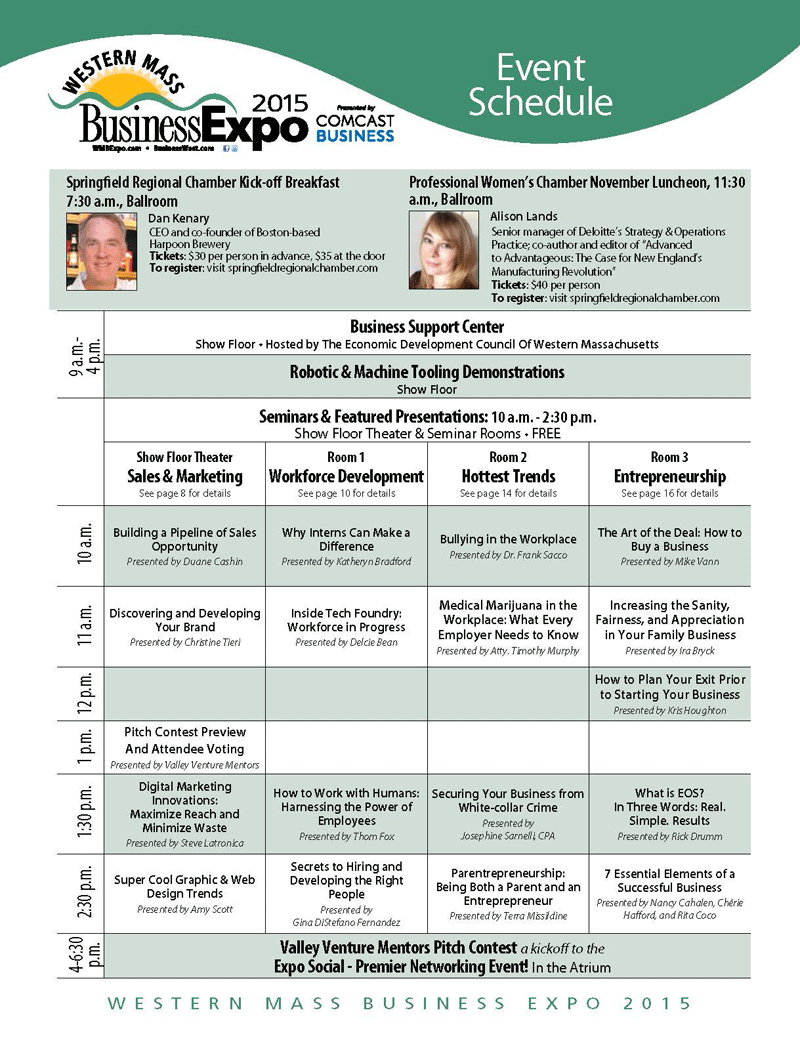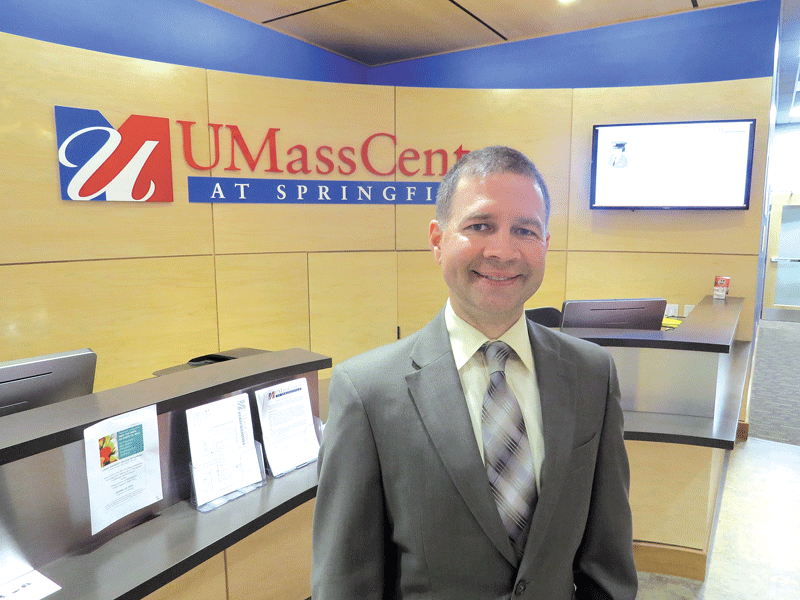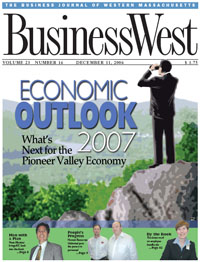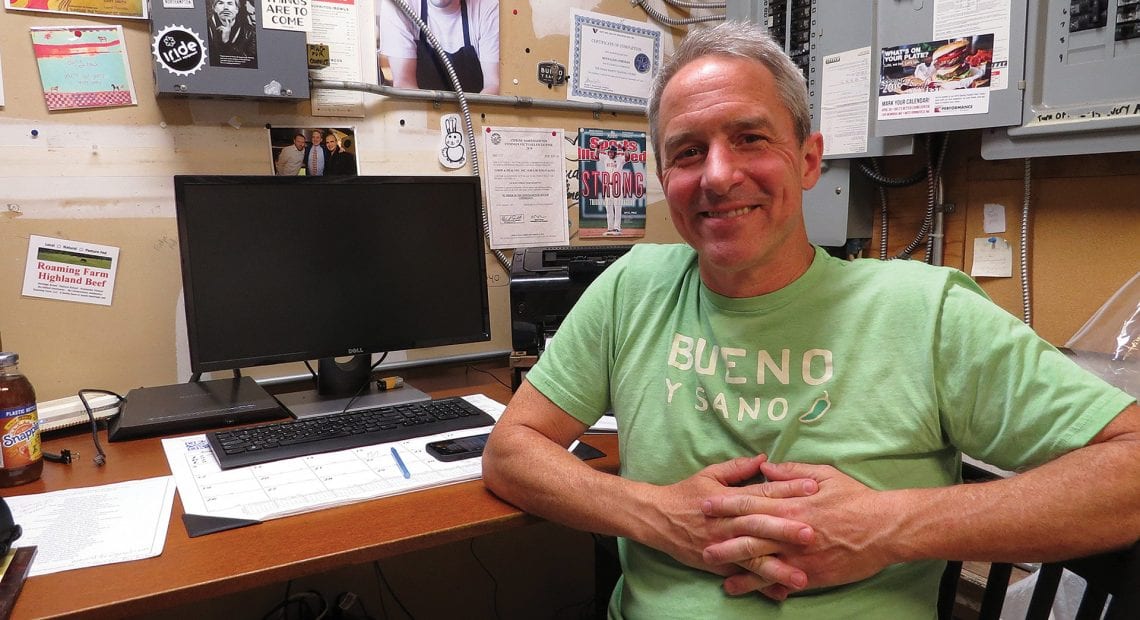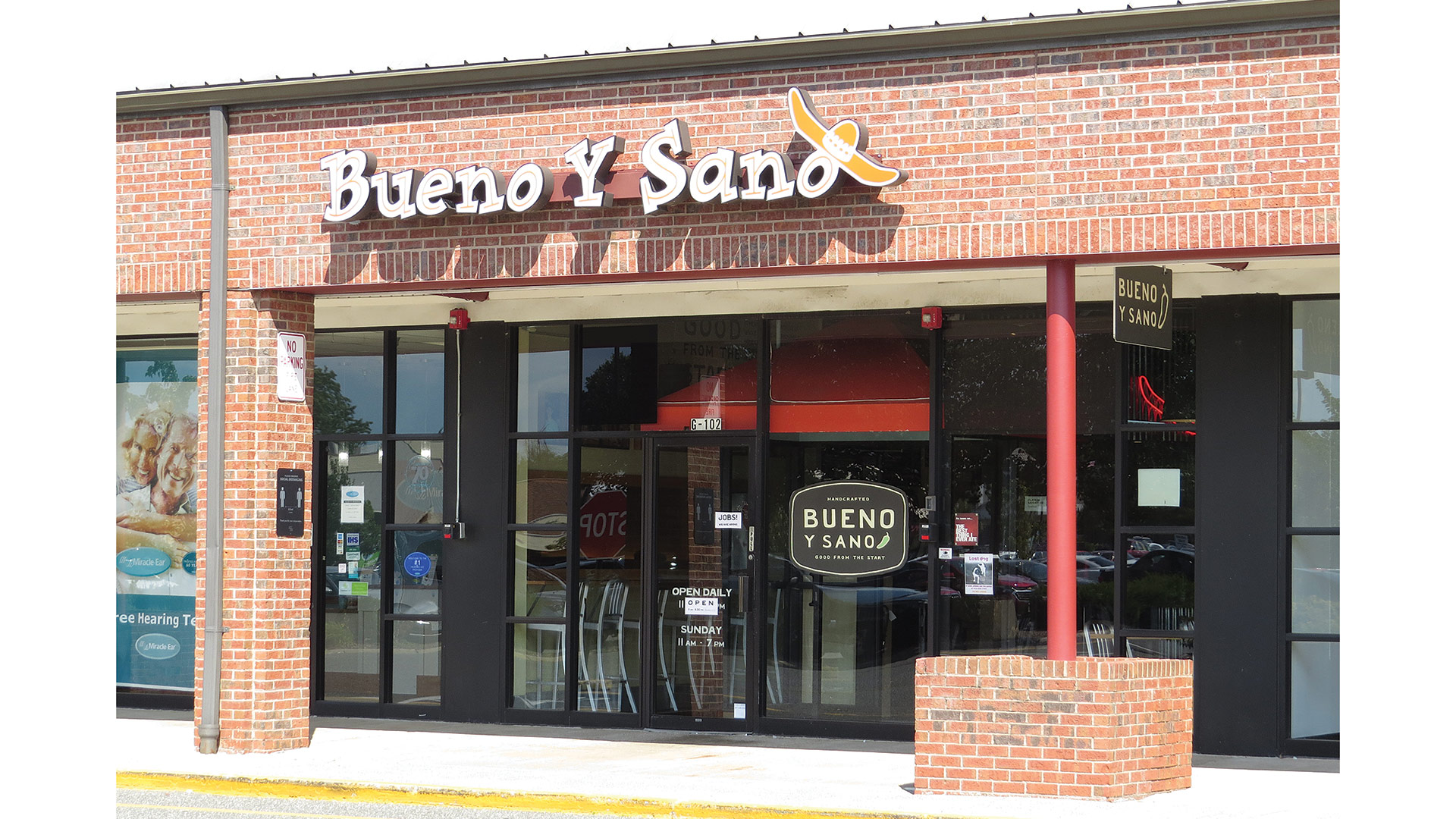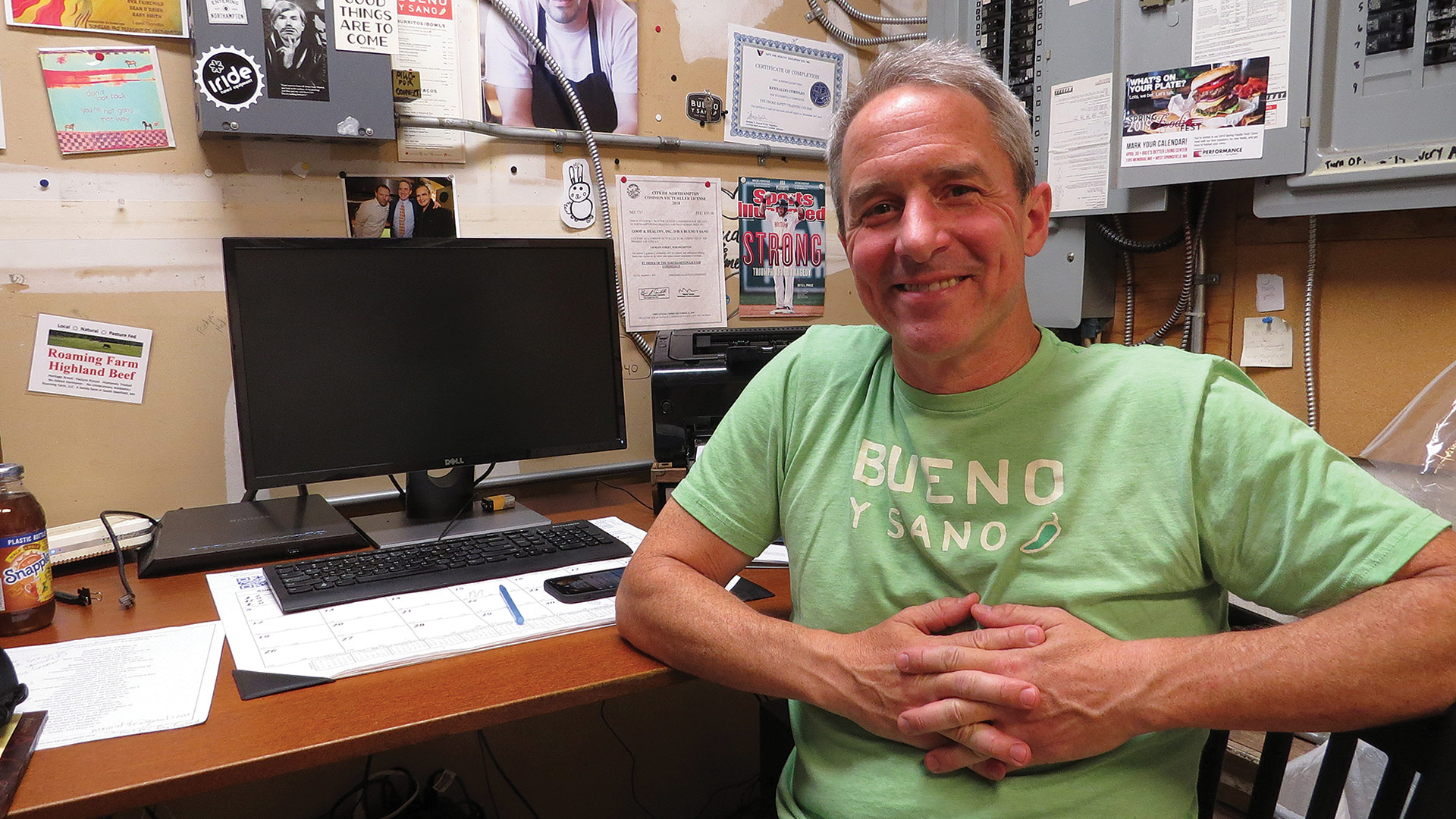Amassing ‘Reputational Capital’
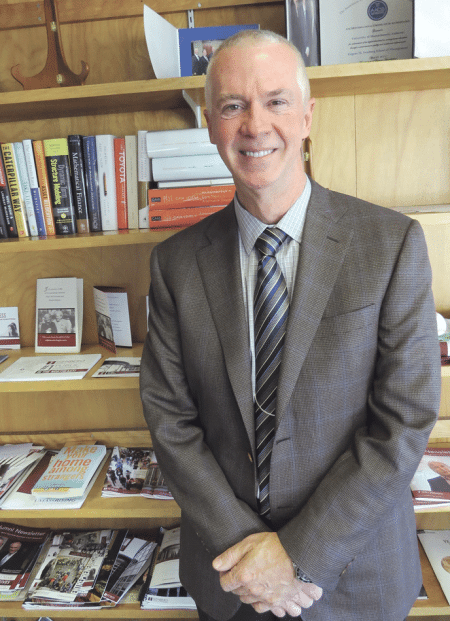
Isenberg School Dean Mark Fuller
When Mark Fuller became a candidate for dean of the Isenberg School of Business at UMass Amherst, he saw an institution that was, by his estimation, “solid, but underperforming.” That latter adjective no longer applies. Indeed, Isenberg has made a solid move in the rankings of public schools, reaching No. 1 in BusinessWeek’s compilation of the top public schools in the Northeast. The challenge ahead — and it’s a considerable one, to say the least — is to achieve the additional ‘reputational capital’ to move still higher.
Mark Fuller says he gets asked the question all the time.
It comes in various forms, and is put to him by a host of constituencies, including school administrators, alums, other business-school deans (lots of those), and even the occasional business writer.
They all want to know how Fuller, who arrived as dean of the Isenberg School of Management at UMass Amherst in 2009, has been able to orchestrate a steady and quite impressive climb in the rankings of the region’s — and the nation’s — top business schools, especially the public institutions.
To wit, in Bloomberg BusinessWeek’s current undergraduate business-school rankings, Isenberg ranks first among public schools in the Northeast (New England and New York) and 11th in the nation; among all business schools in the nation, it is 33rd. Just six years ago, those last two rankings were 36 and 78, respectively.
The answer to the question comes mostly in a long form — and you need to set aside more than a few minutes if you want that one — but also a short form, or at least a brief overview that identifies the main elements in the equation.
They are, said Fuller, creating a plan and, more importantly, executing it effectively, while also creating a culture laser-focused on student success (much more on that later).
“I’m a shameless borrower of phrases, like the one from a CEO who came to our school. He used to say that it’s 10% strategy and 90% execution, and I believe that,” said Fuller. “We’re very good at execution, and we have to be, because there’s no magical degree program that suddenly elevates you 30 spots in the rankings; it doesn’t work that way.
“Everyone knows what you should be doing — it’s not rocket science,” he went on. “Where the rubber meets the road is how well you execute on all these things.”
To make a long story somewhat shorter, this is essentially what the Isenberg School has done — and this is, in a nutshell, what Fuller tells all those who ask him the question noted above.
List of Colleges with MBA Programs
Getting more specific, Fuller said there are, quite obviously, many components to the school’s plan. They include everything from the creation of new curricular programs to raising the money needed for the endowed chairs and faculty positions needed to recruit some of the best business professors in the world; from greatly escalating efforts to promote and market Isenberg to the scene going on outside Fuller’s office — construction of a $62 million expansion of the school.
He summed up everything that’s been accomplished to date by saying that Isenberg now has a much better story to tell — in terms of everything from faculty to facilities to the success of its graduates — and is doing an exponentially better job of telling that story.
He lumps all of this together in the phrase ‘reputational capital.’ The school has much more of it than it did a decade ago, and the mission is, well, to simply accumulate much more of this precious commodity in the years to come.
That’s the only way to continue moving up in the rankings, said Fuller, who has the specific goal of propelling Isenberg into the top 10 nationally among public schools.
In many respects, moving up several more rungs will be more difficult than attaining the height currently reached, he said, drawing an analogy to golf — sort of. It is not easy, but easier to move from an 18 handicap into the single digits, he acknowledged, than it is to move from a 6 or an 8 to something approaching scratch.
So it is with business schools and climbing in the rankings, he went on, because doing so will take more work, more money, more of everything else listed above, and, overall, more success in transforming Isenberg into what Fuller called a “national brand” when it comes to business schools.
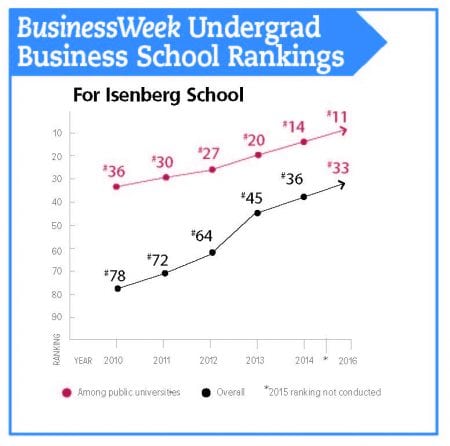
It is not quite there yet, he told BusinessWest, noting that the single word Isenberg, while it certainly resonates regionally, is not yet able to stand alone like other brand names such as Haas (University of California at Berkely); Ross (University of Michigan at Ann Arbor); and McIntire (University of Virginia).
“We want to become an iconic brand,” he said. “So when someone says, ‘I went to Isenberg,’ people know where that is. Iconic brands are one-word brands.”
For this issue and its focus on education, BusinessWest asked the question seemingly everyone else is asking, but then went further, asking how Isenberg can soar still higher and what it will take for the school to achieve that ‘national brand’ status.
Numbers Game
Fuller said there are myriad ways to both quantitatively and qualitatively measure a business school’s success and level of improvement.
These include everything from the number of undergraduate applications received (up a whopping 49% at Isenberg since 2010) to the average SAT scores of accepted students (up from just over 1,200 in 2011 to nearly 1,280 in 2015; from something called ‘recruiter satisfaction,’ which, as that term suggests, is a measure of recruiter happiness with those they recruit, to comments (and a growing number of them) from alums noting that their children were accepted into many of the top private business schools nationally, but not Isenberg; from the rising number of endowed chairs to that aforementioned construction of a 72,000-square-foot addition.
But rankings continue to drive the train, if you will, in academia these days, he noted, and attaining lower numbers in all kinds of compilations was Fuller’s primary mission when he arrived on the Amherst campus in 2009 after serving for six years as chair of the department of Information Systems in the College of Business at Washington State University.
Actually, he said the more specific goal has been to increase the stores of reputational capital, and that rankings are merely a metric of reputation, or one of many, with others being placement rates at Big-4 accounting firms and penetration into leading financial-services giants such as Goldman Sachs and J.P. Morgan, among others.
“I would like to see us become one of the top 10 public schools in the nation and within the top 20 overall,” he explained, adding that the school is certainly on the right trajectory for those results, but needs to maintain that course and gain more thrust to break those barriers.
And while climbing in the ranks equates to opportunities for the school and the university, he said, the far more important matter is that better rankings and reputation translate into greater opportunities for the students enrolled in the programs.
“Those sorts of universities provide great opportunities for their students,” he said of the schools at or near the top of the rankings. “When you come out of a place with that level of reputational capital, there are simply more job opportunities and higher salaries. And that reputational capital not only allows us to place students better, it allows us to recruit very high-quality students, which builds this sort of perpetual-motion machine that also allows us to recruit very high-quality faculty.”
Backing up a bit, Fuller said he was attracted to the opportunity to lead Isenberg because he saw a solid program that was, in his view, but also that of many others, underperforming.
And he saw an opportunity to change that equation.
“It had a great foundation — I couldn’t have done the things we were collectively able to do without the outstanding faculty we had here,” he explained. “I saw an opportunity to go from high quality to great.”
And while designing and building that perpetual-motion machine he mentioned isn’t the specific wording on his job description, that, in a nutshell, is what he and his team have been doing.
Degrees of Progress
Not to oversimplify things, said Fuller, because there is nothing really simple about all this, attaining more reputational capital, and thus climbing in the ranks, boils down to those two elements mentioned earlier: improving the story a business school has to tell (and there are many elements in this equation) and then telling this story in a louder, more effective voice.
And this brings us back to those main assignments for his team — creating a plan and then executing it.
The plan, Fuller told BusinessWest, has many elements, or building blocks, if you will, all incorporated into the design for a reason — or several of them.
Indeed, at its core, the plan is simple — create programs, hire faculty, and generate quality and results (outcomes) that will:
• Attract top students and enable graduates to succeed in the workplace;
• Generate enthusiasm and financial support among a host of constituencies, but especially alums;
• Enable the school to generate more reputational capital;
• Propel the institution higher in the rankings; and
• Create sufficient momentum to allow each of the above to perpetuate itself and grow in size and strength.
Elaborating, Fuller said everything his team does is student-focused and undertaken with the goal of improving outcomes, meaning everything from job opportunities to salaries.
One of the keys, he said, has been an outside-in look at curriculum, whereby industry leaders provide input on what’s being done and what can be done better.
“We’re trying to find those curricular, programmatic elements that will drive great opportunities for students,” he explained. “And we’re very deliberate in that; we don’t chase just any new majors.”
Instead, the school focuses on where the jobs are and, more importantly, where they will be, in realms such as analytics, business intelligence, and operations and information management.
Meanwhile, the school has also made major strides in the area of professional development, with initiatives aimed at creating internships, generating opportunities to study abroad (a nod toward an increasingly global economy), and helping students improve interviewing skills, network more effectively, and refine their LinkedIn presence, among other things.
“Many of our students will actually say that their peers at other schools and colleges across campus go to them to learn how to refine their résumé or their LinkedIn profile,” he explained. “And we hit the ground running on that; our students will have a résumé and LinkedIn profile by the end of their freshman year.”
Another focus, as mentioned earlier, is that statistic known as recruiter satisfaction, he went on, adding that Isenberg hired a director of organizational metrics, who, among things, garners hard data on just how happy recruiters are with the school’s graduates.
“It’s like flying on an airline,” Fuller explained. “You fly, you get a survey; the airline asks, ‘how did we do?’ We do the same thing.”
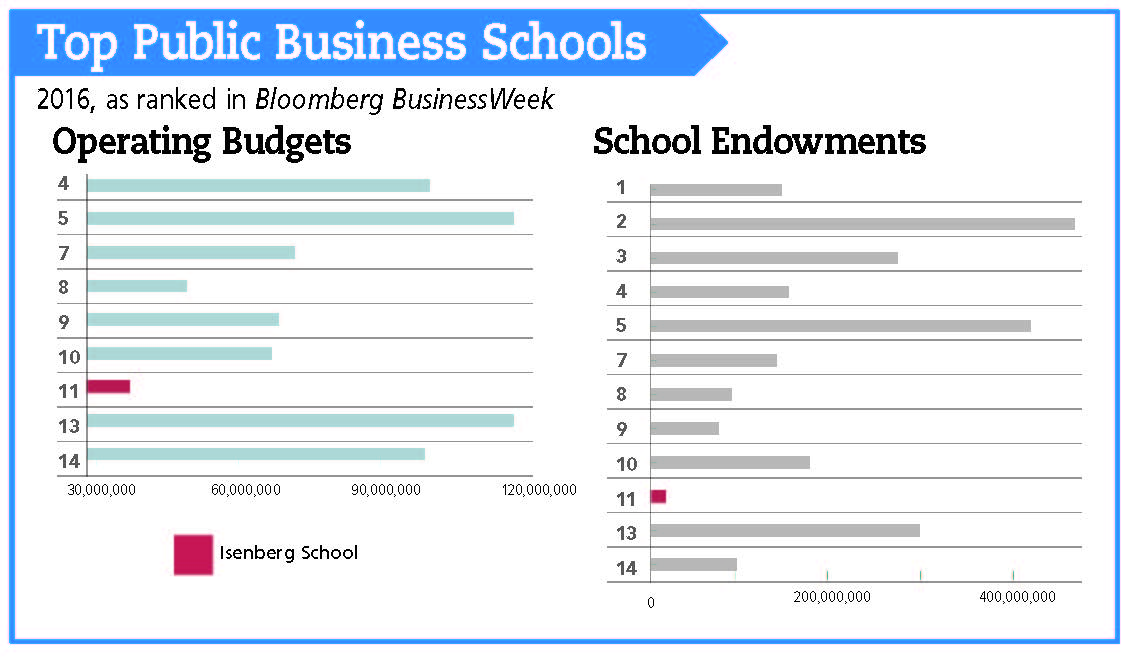
And it turns the results, especially those that are not particularly favorable, into action, he went on, noting that one identified problem was with résumés, criticism that eventually led to efforts to improve and standardize those documents, so much so that recruiters can now easily recognize something Fuller called the “Isenberg résumé.”
As for growing support among alums and other groups, Fuller drew an analogy to big-time college sports.
“Attendance for basketball games where a team is losing is less than it is for a school that’s winning,” he explained. “For alumni, there was a real sense that we had to build pride in the brand, because the public business schools across the country are a very competitive set of schools, and we all want to be competitive.”
Story Lines
When it comes to telling the story better, Fuller started by gesturing across the conference room table to Chris Foley Pilsner. Her business card reads ‘Assistant Dean & Chief Marketing Officer,’ and she is the first at Isenberg to have such a title.
More importantly, she leads a growing team of professionals, said Fuller, adding that the school has become much more aggressive in recent years when it comes to promoting its brand.
“We also have a digital strategist and social-media director, among other positions,” he explained. “We’re building up that infrastructure that allows us to tell our story about how good we’ve become.
“Many people know we’ve gotten better, but they’re not cognizant of how much better we’ve gotten,” he went on. “I hear that from alumni, even; they don’t know how good we’ve really become.”
The goal moving forward is to simply have better news to report, said Fuller, meaning continuous improvement. And, as he noted, moving ever-higher becomes more difficult because the competition is more keen, and those ahead of Isenberg in the rankings have every intention of staying where they are or moving higher themselves.
Continued upward movement is made still more challenging by two rankings where Isenberg lies at the very bottom of the chart, at least among the top public schools. These would be ‘operating budgets’ and ‘school endowments.’
Indeed, Isenberg has an operating budget of $38.2 million (less than one-quarter the total registered by the top-ranked public school, Indiana University’s Kelley School), and an endowment of just over $31 million, far less than one-tenth the figure at the University of Virginia’s Darden School, ranked second overall by BusinessWeek.
In many ways, how far UMass has come despite those statistics are serious points of pride, said Fuller, but those factors, and also the lowest total (70) of tenure-stream faculty among the top schools, will represent serious hurdles to moving higher.
“We like to say, affectionately, that we fight above our weight class,” he said while referring specifically to the operating budget and endowment rankings. “But we also know that you can’t continue to do that, so we’re trying to get our alumni to help us figure out how to grow this operating budget.”
Elaborating, he said that financial gifts from alums are not the only way to enlarge the budget. Others include corporate gifts, grants, and foundation support, and alumni can assist with all of the above.
Overall, to move still higher in the rankings, Fuller and his team will have to build what amounts to a bigger, even more effective perpetual-motion machine, and continue their focus on execution.
To elaborate, he moved to the whiteboard in the conference room and drew a rudimentary schematic, in the form of a circle with the word ‘reputation’ in the middle, and references to the three elements that drive it — programs, infrastructure, and image — and the need to focus on all three.
Image, as noted earlier, is a measure of how others perceive your school, and includes everything from the many regional and regional rankings to efforts to tell the story. Programs, meanwhile, as mentioned, include everything from curricular initiatives to professional-development tools. And infrastructure is a broad term used to describe everything from facilities to the faculty, and it is perhaps the biggest area of need going forward.
The construction project going on outside Fuller’s window is a prime example of infrastructure work, he noted, adding that, with rising enrollment, Isenberg had no choice but to expand its footprint in order to provide the highest-quality education.
“We need the facilities that will allow us to hire the faculty to drive the quality of the program,” he explained, “because I can’t grow anymore, either in quality or the number of students we teach, without expanding our infrastructure.”
Another element of infrastructure is the faculty, he said, noting that the school needs to grow its endowment so it can add more endowed chairs and teaching positions and thus enhance recruitment efforts in that realm.
“The big hurdle for us to move into the top rung of the rankings is to continue to build this infrastructure of resources that will enable us to compete,” he said, drawing another analogy to college sports, this time to the elaborate training facilities needed to recruit top players and coaches to athletic programs.
Off-the-charts Improvement
When asked if there was an accepted road map for public business schools to follow to attain growth and reputational capital, Fuller said ‘no,’ but also that this is another question that those other deans put to him.
Specifically, they want to know the route Isenberg followed to become number 1 in the Northeast and reach a status just outside the top 10 nationally.
He tells them it’s a well-marked route, but the key isn’t knowing the directions; it’s in executing them properly.
That’s how a business school gets where it wants to go.
George O’Brien can be reached at [email protected]



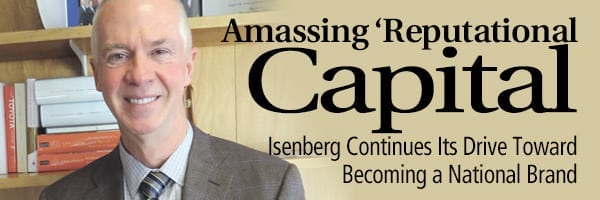

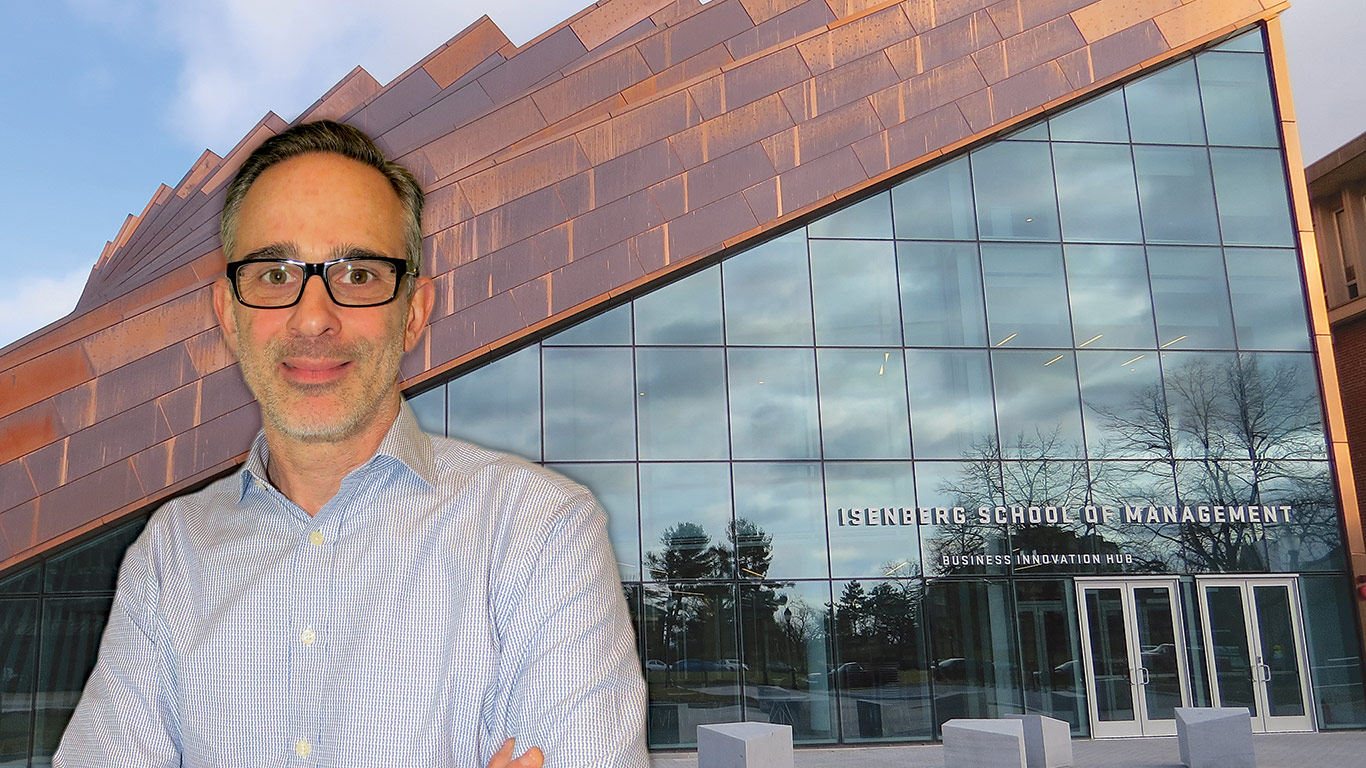

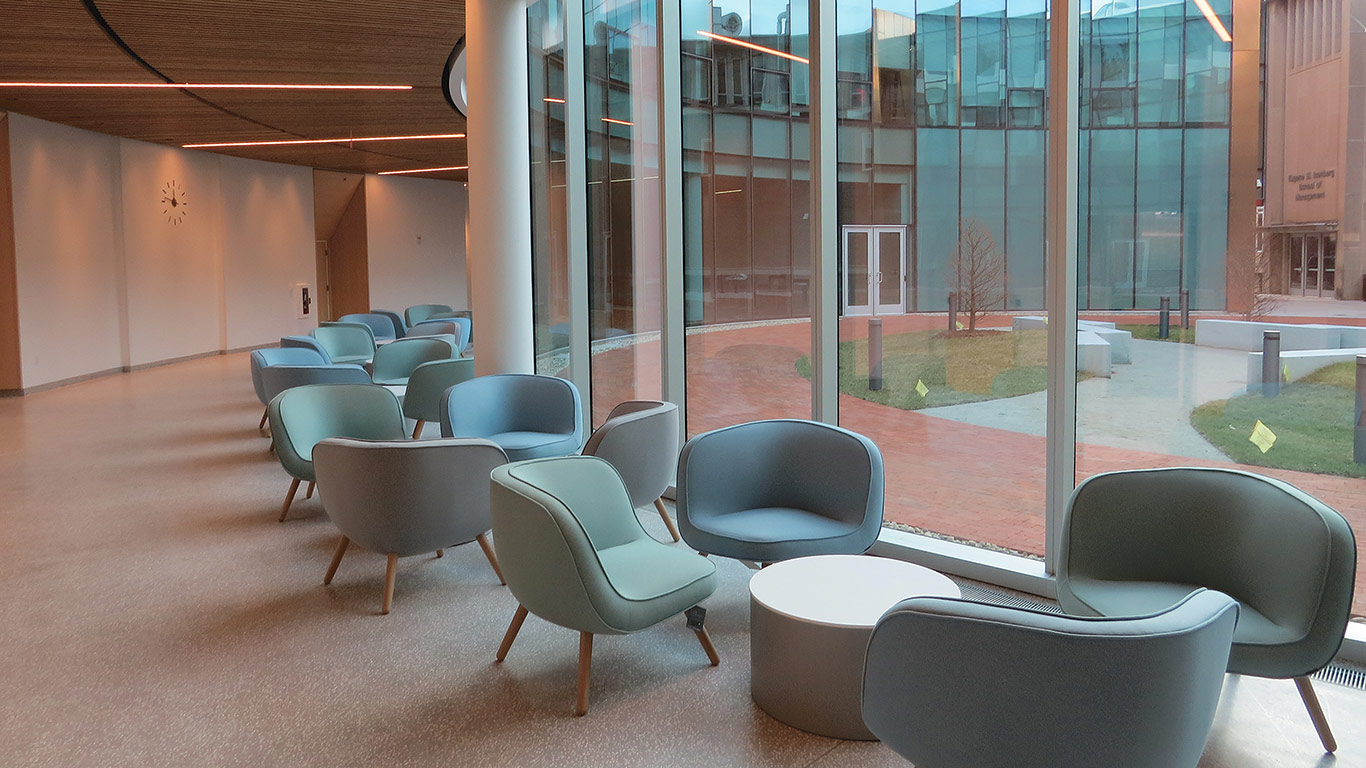

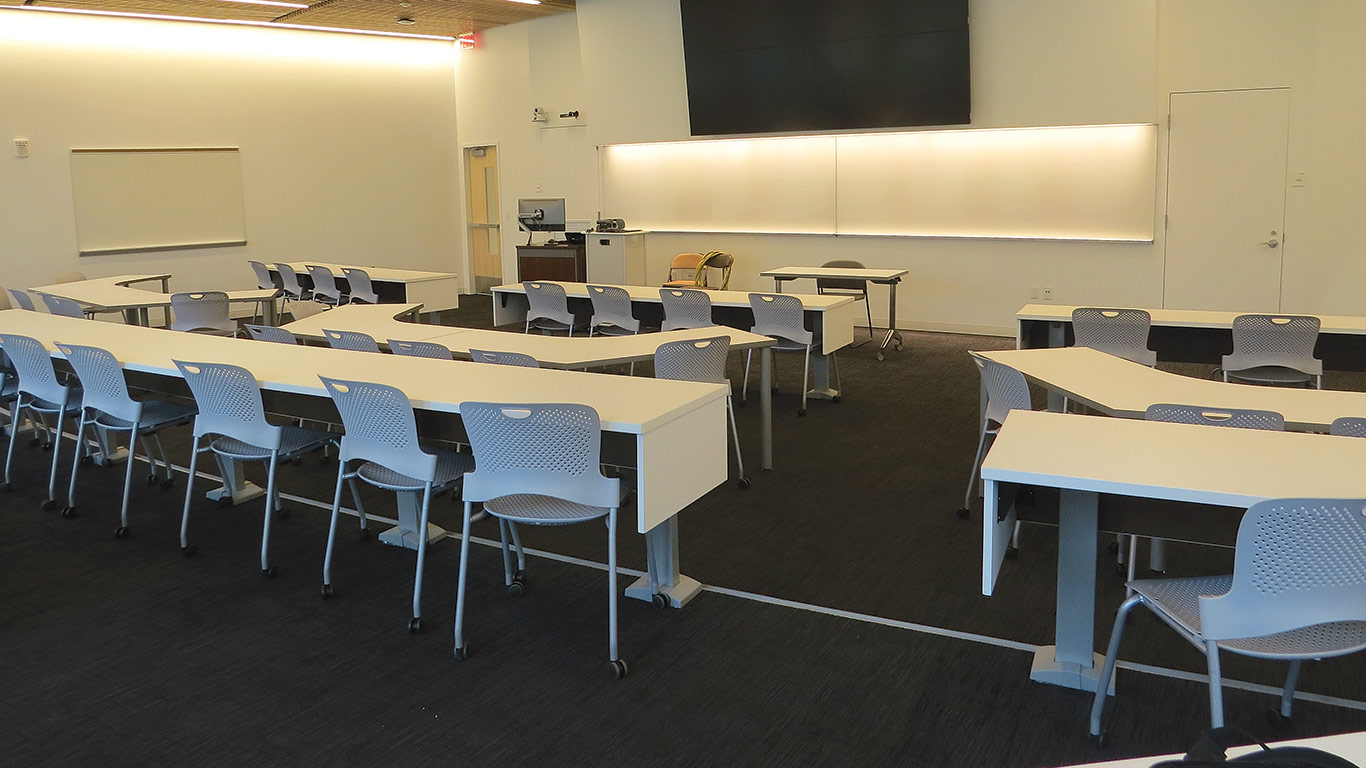


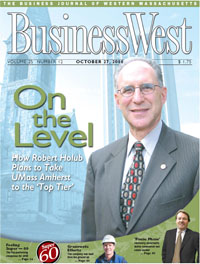
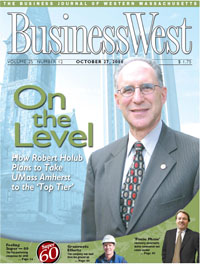



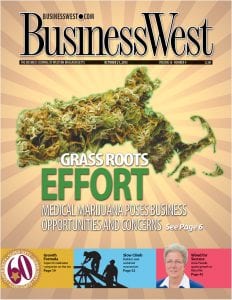
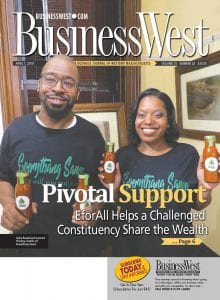
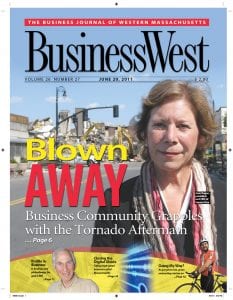 There aren’t many residents and business owners who don’t have vivid recollections of the tornado that roared across Western Mass. on June 1, 2011.
There aren’t many residents and business owners who don’t have vivid recollections of the tornado that roared across Western Mass. on June 1, 2011.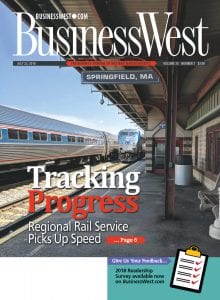

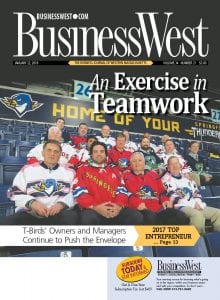
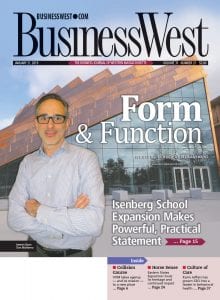
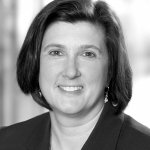


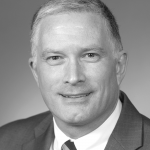
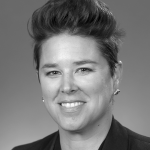

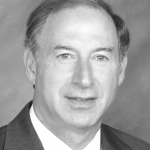
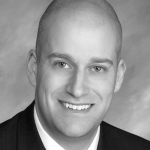

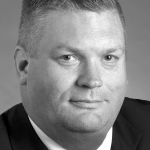


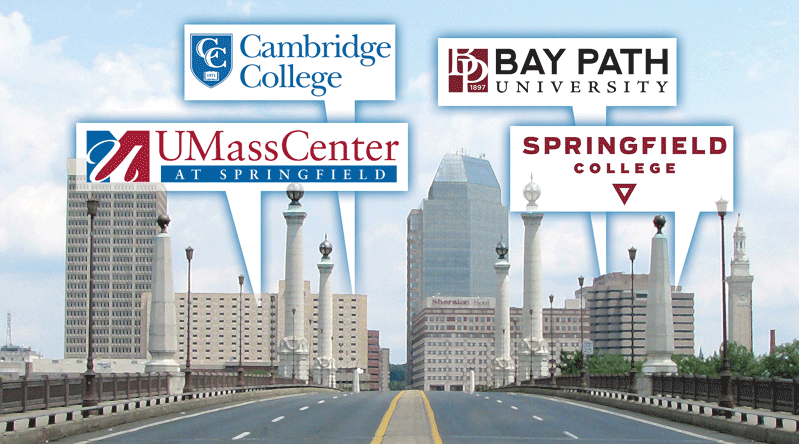
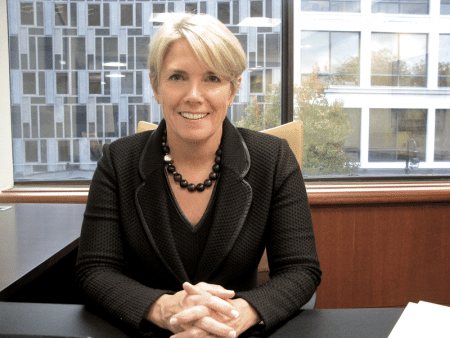
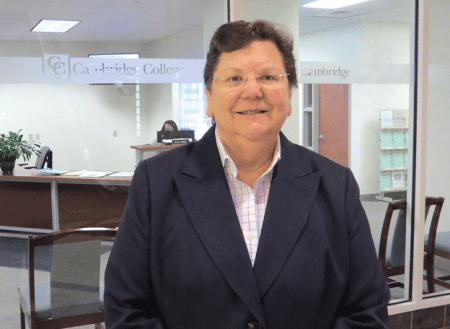
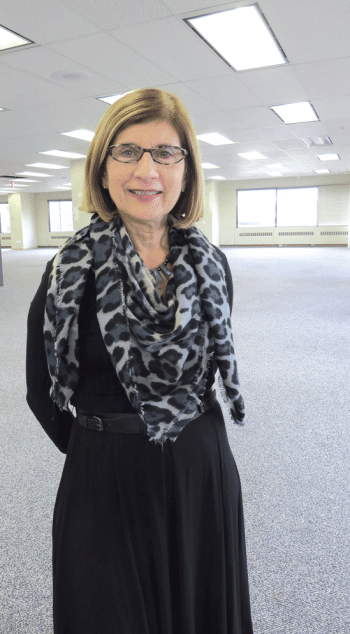


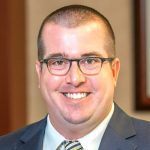


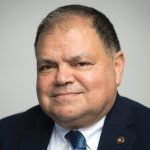




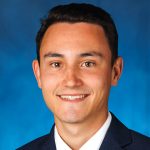
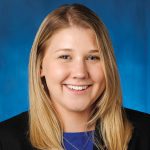






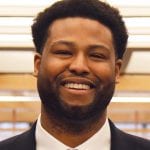

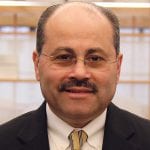
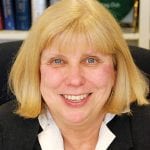
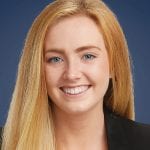



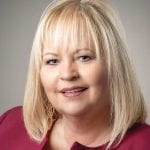

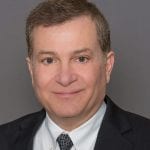


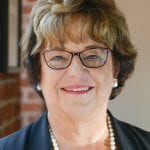

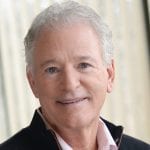

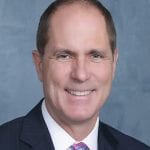 As part of its planned expansion of commercial banking talent and resources across the Northeast, KeyBank announced that Matthew Hummel has joined the bank in the newly created position of Commercial Banking team leader, reporting to market president James Barger. In his new role, Hummel will lead and expand the team of commercial bankers serving middle-market clients in Connecticut and Western Mass. and help drive KeyBank’s commercial business growth throughout the market. Hummel brings more than 30 years of commercial-banking experience to KeyBank, primarily from Bank of America’s Global Commercial Banking group, where he strategically aligned banking resources to the needs of middle-market companies requiring complex debt, capital markets, currency, treasury, and other financial solutions. He holds an MBA from Rensselaer Polytechnic Institute at Hartford, and a bachelor’s degree from Colby College. He has strong ties to the local community and has volunteered at a number of nonprofit organizations, including Smilow Cancer Center’s Closer to Free bike tour, Literacy Volunteers of America, and Habitat for Humanity. He has served as a Glastonbury Basketball Assoc. board member and boys travel basketball commissioner since 2005.
As part of its planned expansion of commercial banking talent and resources across the Northeast, KeyBank announced that Matthew Hummel has joined the bank in the newly created position of Commercial Banking team leader, reporting to market president James Barger. In his new role, Hummel will lead and expand the team of commercial bankers serving middle-market clients in Connecticut and Western Mass. and help drive KeyBank’s commercial business growth throughout the market. Hummel brings more than 30 years of commercial-banking experience to KeyBank, primarily from Bank of America’s Global Commercial Banking group, where he strategically aligned banking resources to the needs of middle-market companies requiring complex debt, capital markets, currency, treasury, and other financial solutions. He holds an MBA from Rensselaer Polytechnic Institute at Hartford, and a bachelor’s degree from Colby College. He has strong ties to the local community and has volunteered at a number of nonprofit organizations, including Smilow Cancer Center’s Closer to Free bike tour, Literacy Volunteers of America, and Habitat for Humanity. He has served as a Glastonbury Basketball Assoc. board member and boys travel basketball commissioner since 2005.



 Elms College announced the promotion of Teresa Kuta Reske to the position of associate dean of Graduate and Doctoral Studies for the School of Nursing. Reske was on the leadership team that developed the doctor of nursing practice (DNP) program and has served as director since its inception in the fall of 2014. She will continue to lead the program in this new role. Among her accomplishments, Reske co-authored a chapter in DNP Education, Practice, and Policy: Redesigning Advanced Practice Roles for the 21st Century (2012) and is a journal reviewer for the Journal of Professional Nursing. In addition, she has presented locally, nationally, and internationally on DNP practice-related topics, patient-experience-related topics, nurse telephone triage, and nursing informatics. Reske holds a BS in nursing from Saint Anselm College, a MPA from the University of New Haven, an MSN in health systems from Vanderbilt University, and a DNP degree in executive nurse leadership from the MGH Institute of Health Professions.
Elms College announced the promotion of Teresa Kuta Reske to the position of associate dean of Graduate and Doctoral Studies for the School of Nursing. Reske was on the leadership team that developed the doctor of nursing practice (DNP) program and has served as director since its inception in the fall of 2014. She will continue to lead the program in this new role. Among her accomplishments, Reske co-authored a chapter in DNP Education, Practice, and Policy: Redesigning Advanced Practice Roles for the 21st Century (2012) and is a journal reviewer for the Journal of Professional Nursing. In addition, she has presented locally, nationally, and internationally on DNP practice-related topics, patient-experience-related topics, nurse telephone triage, and nursing informatics. Reske holds a BS in nursing from Saint Anselm College, a MPA from the University of New Haven, an MSN in health systems from Vanderbilt University, and a DNP degree in executive nurse leadership from the MGH Institute of Health Professions.




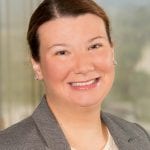
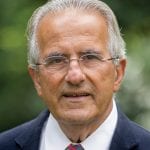







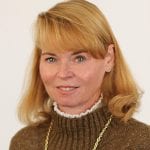


 Jessica Derouin has rejoined the Training Resources of America Inc. (TRA) team as manager of the Springfield office located at 32-34 Hampden St. She had previously been employed by TRA for eight years, serving as Western Mass. regional manager, assistant manager, and instructor/case manager. She holds a bachelor’s degree in psychology from River College in New Hampshire. TRA, headquartered in Worcester, is a private, nonprofit organization that has been providing education, employment, and training services.
Jessica Derouin has rejoined the Training Resources of America Inc. (TRA) team as manager of the Springfield office located at 32-34 Hampden St. She had previously been employed by TRA for eight years, serving as Western Mass. regional manager, assistant manager, and instructor/case manager. She holds a bachelor’s degree in psychology from River College in New Hampshire. TRA, headquartered in Worcester, is a private, nonprofit organization that has been providing education, employment, and training services.





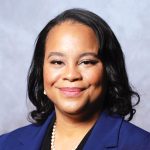

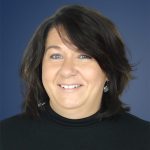

















 The construction sector has always been a good barometer when it comes to the economy and what may happen with it in the foreseeable future. And this historical trend is one of many reasons why cautious optimism abounds in the region. Indeed, many firms report that they have a number of projects on the books for the year ahead and beyond, and that these projects involve a number of economic sectors.
The construction sector has always been a good barometer when it comes to the economy and what may happen with it in the foreseeable future. And this historical trend is one of many reasons why cautious optimism abounds in the region. Indeed, many firms report that they have a number of projects on the books for the year ahead and beyond, and that these projects involve a number of economic sectors.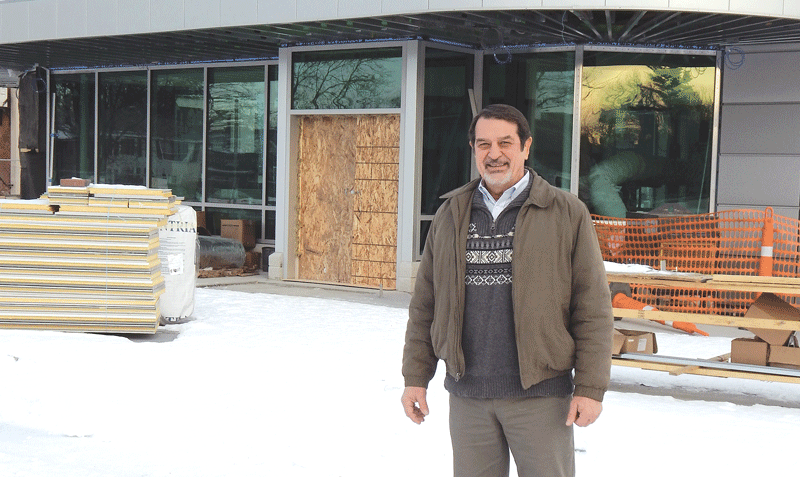
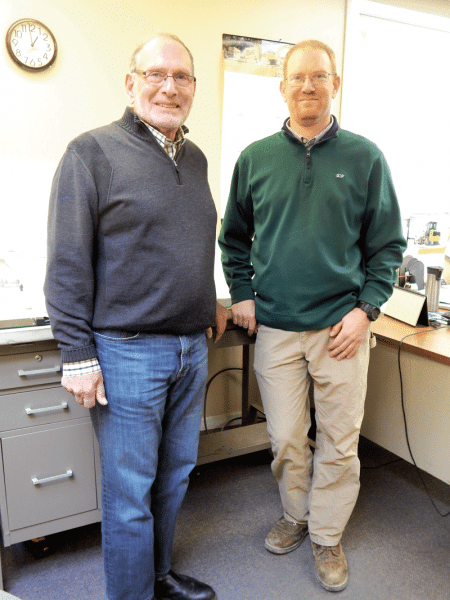

 It was becoming clear weeks ago that the novel coronavirus would have some sort of economic impact once it washed ashore in the U.S. — but it’s still not clear, and perhaps won’t be for some time, how severe and wide-ranging the damage could be, as people cancel travel plans, curtail business operations, shut down college campuses, and take any number of other actions to stay safe. It’s a fast-moving story, and one that’s only beginning.
It was becoming clear weeks ago that the novel coronavirus would have some sort of economic impact once it washed ashore in the U.S. — but it’s still not clear, and perhaps won’t be for some time, how severe and wide-ranging the damage could be, as people cancel travel plans, curtail business operations, shut down college campuses, and take any number of other actions to stay safe. It’s a fast-moving story, and one that’s only beginning.






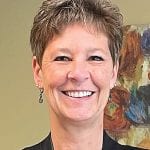
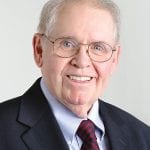






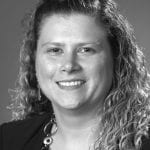











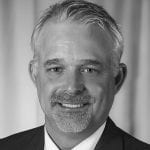




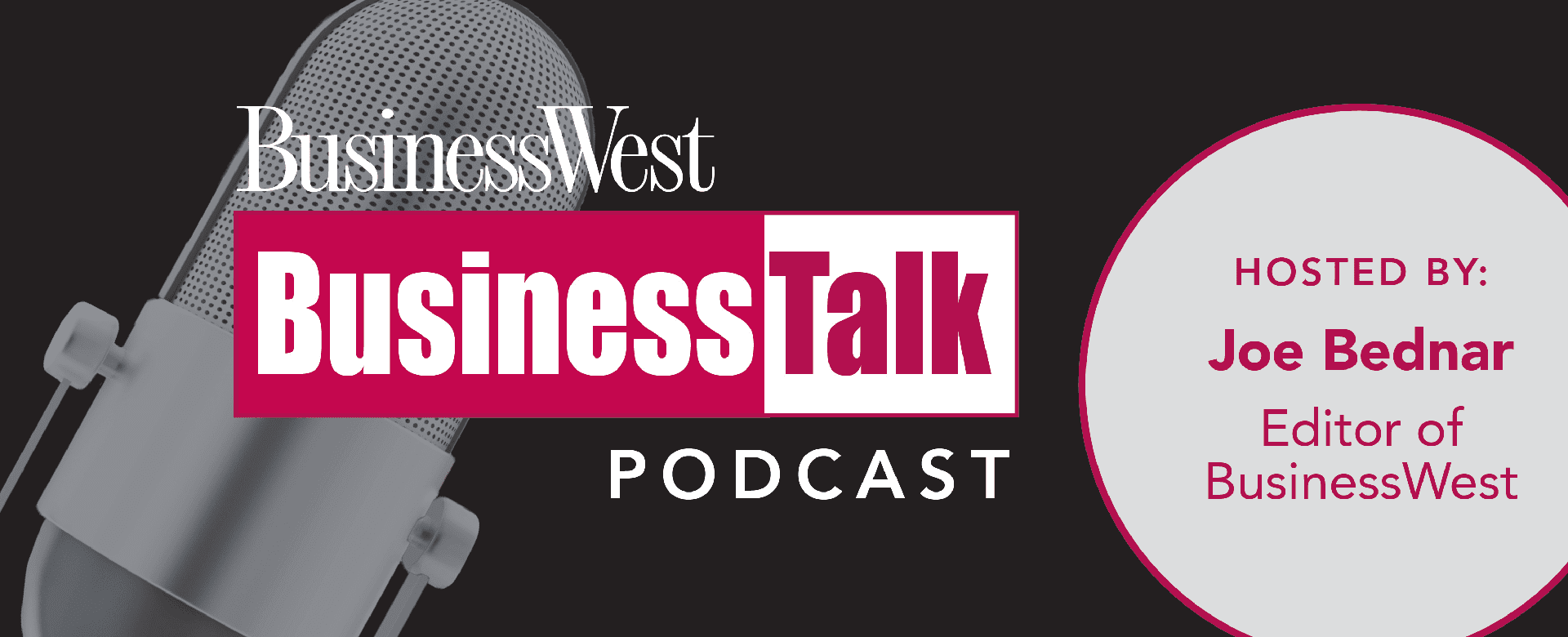
 , Editor of BusinessWest & Healthcare News. Joe is a veteran writer and copy editor with more than two decades of experience covering Western Massachusetts.
, Editor of BusinessWest & Healthcare News. Joe is a veteran writer and copy editor with more than two decades of experience covering Western Massachusetts. George O’Brien, Editor and Associate Publisher for BusinessWest & Healthcare News, is one of the region’s most experienced and respected journalists, with more than 30 years’ experience as a writer and editor.
George O’Brien, Editor and Associate Publisher for BusinessWest & Healthcare News, is one of the region’s most experienced and respected journalists, with more than 30 years’ experience as a writer and editor.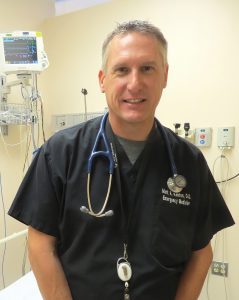

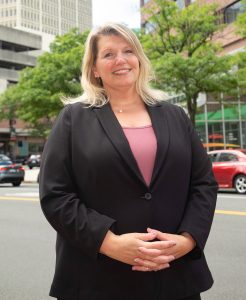

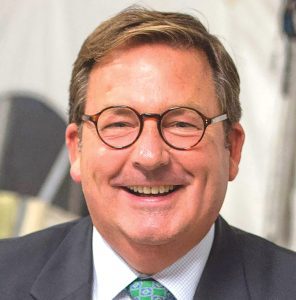
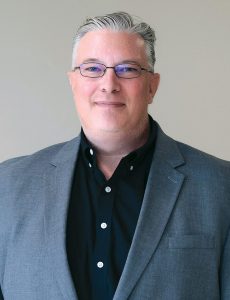
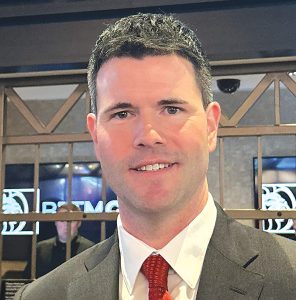

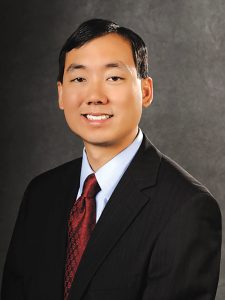
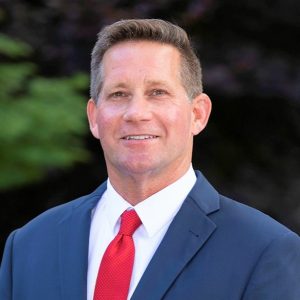








 After six years of largely uninterrupted economic growth in both Massachusetts and the U.S. as a whole, questions have arisen as to how long the expansion can last, especially coming on the heels of an unusual election season and amid sluggish economic trends internationally. The consensus seems to be that the present course should hold in 2017, but also that recessions are a regular occurrence in the American economy, and it wouldn’t take much to spark a slowdown. For now, though, cautious optimism reigns.
After six years of largely uninterrupted economic growth in both Massachusetts and the U.S. as a whole, questions have arisen as to how long the expansion can last, especially coming on the heels of an unusual election season and amid sluggish economic trends internationally. The consensus seems to be that the present course should hold in 2017, but also that recessions are a regular occurrence in the American economy, and it wouldn’t take much to spark a slowdown. For now, though, cautious optimism reigns.
